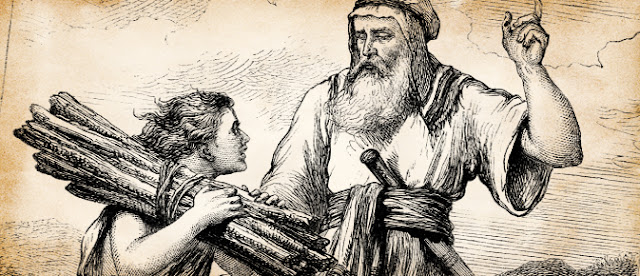Saniaga Genealogy Documentation from a Biblical perspective
Well chronicled from The Beginning to The End, it is such a genealogical record that also stretched on its limits. Yet we cannot fault it because mythology was also a way of looking at the world wholly in the yester years of our progenitors. The world came into being in different ways in different mythologies. When we sieve such information, we are left with the tangibles as the name of the father of Abraham. The years he lived, the words he pleaded to God with when He wanted to destroy Sodom and the sheep that he would sacrifice in the place of his only son are good stories that add flesh to the character, Abraham. Names are nothing without stories. And the stories are nothing really but mind niceties that can be subjected to study as history.
In a Jewish camp wall, during
holocaust, a victim inscribed, ‘If there is a God, He will have to beg for my
forgiveness.’ An objective way of looking at it is that he was but questioning
the essence of his heritage that for generations has called upon and expected
God to fight for them. Yes, in several occasions God did ‘cover’ the Israelites
out of sight of their enemies. Even at the time when Israelites had wronged
others. An example is with the sons of Jacob who had lured the people of
Shechem to circumcision after Dinah was raped and they had used the opportunity
as all men pained to kill them. They ran away protected by God. A history that
if miscommunicated with prejudices of entitlement can create unnecessary superiority,
temerity, source dislike from others or total desperation if things do not work
for you.
Migrations, settlements and
causes go a long way to inform interactions and relationships with other people
and tribes. Adam was in the serene garden of Eden and many tribes place their
origin at a treasured area. And he was not alone in the world for Cain asked
pardon before he could go out mingling with other tribes. And these all other
tribes suggestively may have been killed all during the flood. The sons of Noah
- Japheth, Ham and Shem are the progenitors of all people – clans, tribes and
nations. Later as Abram was renamed Abraham and promised to be the father of a
great nation as the stars he was the tenth in generations from Noah. The
nineteenth from Adam, Alfa father.
Moving to Egypt and coming out of
Egypt as a great favoured nation and later on conquest after conquest places
the tribe of Israel in the similar historical savage position where tribes had
no trust with others. Theft and plunder was a way of accumulating wealth and
gaining easily than working. It was a taboo to kill a tribe mate but not an
‘enemy’ who was trying to defend their town.
Unfairness, irresponsibility and personal weaknesses as quickness to
anger were a bore to God, the spirit of the tribe. Prophets who fed on bush
honey and lived in the wild had an eye to community change, preferring to keep
pure. Affluence informed Wisdom as in the proverbs of Solomon and Psalms of
David, and if anyone read the tribes scattered later and Rome colonized them. A Jewish state would be founded later May 14th 1948.
When Mathew opens up the new
testament with the genealogy of Jesus, he not only tells the Israelites that ‘here
is one of your own blood and ancestry’ but also ‘your course is rebranded.’
People had lost the zeal, unity and would even lose their history’s rallying
call – if you repent, change your ways and turn back to God, he will hear you. It
is true that communities, societies and nations are afflicted with all manner
of social ills when people pull to themselves rather than together. Proverbs six
sixteen and Galatians five nineteen tells what to avoid to pursue togetherness
of purpose. Hard though it is to keep people focused to issues that would change
their lives for the better. The messenger does not matter, people lose it when they
discuss the group leaders or the group leaders lose it when they make themselves
a subject. Eyes should always be on the prize.
The messiah 2000+ years later is
the one who calls herself or himself a change agent. She identifies with
community issues and trends. She stands
to be counted now and in future for advocating for best practices that aim to better lives of individuals (and in the long run, the community at large). She capitalizes on the
existing trust as family and neighbourhood ties with love for all. People who believe in community change. She has hope for the happier future, on Earth.
-/With Thanks
saniaga.org
saniaga.blogspot.com
info.saniaga@gmail.com
facebook.com/saniaga.org

Comments
Post a Comment